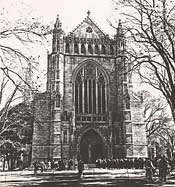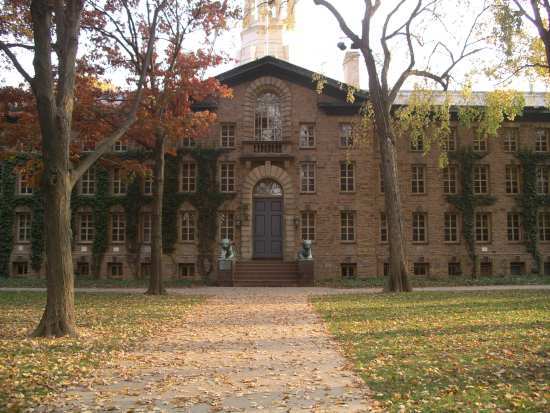Introduction
Princeton is home to a dynamic, diverse community of intellectuals who pursue their passions with unparalleled zeal. Founded in 1746, the university excels both as a major research institution and as a liberal arts college, making it one of the most respected centers of higher learning in the world. Because Princeton does not have an extensive graduate school system, lavish amounts of attention and resources are bestowed upon a relatively small undergraduate population. Basically, if you have a good idea, whether it’s for an independent research project, a campus event, or your own personal growth, Princeton will provide you with the support and funding to make it happen.
Princeton boasts top-notch… well, everything. The campus, which is frequently ranked among the most beautiful in the country, features an art museum, a state-of-the-art music center, a visual and performing arts center, several theaters, an observatory, a plasma physics lab, a center for environmental and energy studies and sixteen libraries containing more than 6.7 million volumes. The university recently renewed its commitment to the sciences with the opening of a new Gehry-designed science library, and it plans to expand its arts offerings through the recently inaugurated Lewis Center for the Arts. A low faculty-student ratio of 5:1, coupled with the advising program, preceptorial system, and faculty office hours, means that undergraduates get remarkable access to luminaries such as Cornel West, Joyce Carol Oates, ten Nobel Prize winners, and twenty-two MacArthur “genius” grant recipients. The university also has a state-of-the-art computing system, a number of academic support centers, a campus healthcare facility, extensive recreation offerings, and a dedicated staff to ensure that students’ needs are met around the clock. “Princeton runs like butter,” summed up one recent graduate. That said, gaining access to all that Princeton has to offer isn’t easy. With an admit rate hovering around ten percent, Princeton is one of the most selective universities in the country. In a recent year, ninety-seven percent of admits ranked in the top decile of their high school graduating classes, and three-fourths had SAT scores higher than 700 in all three sections. However, Princeton isn’t just looking for brainy kids who test well; the admissions office ranks “advanced placement or honors courses,” “recommendations by school officials” and “personality/intangible qualities” as its top three admissions considerations.
Princeton offers seventy-four departments and interdepartmental programs within two bachelor’s degree programs: bachelor of arts (A.B.), and bachelor of science in engineering (B.S.E.). Because of the university emphasis on a broad liberal arts education, course requirements tend to be relatively easy to fulfill, which gives students the flexibility to delve into their own academic interests. Independent study is one of the pillars of Princeton academic life. Depending on their major, students must complete a number of independent projects during their time at Princeton, culminating in the production of a final thesis or project in their senior year.
Campus Life
Princetonians work hard, but they also play hard. Campus life is vibrant, owing to the fact that the vast majority—ninety-eight percent—of students live on campus. Contrary to popular belief, Princeton has a diverse student population; in a recent year, thirty-two percent of students identified themselves as minorities (including African-American, Asian American, Hispanic, Native American, and foreign national) and students hailed from all fifty states and more than ninety-five foreign countries. As a result, entertainment options on campus are varied, and there is never a shortage of things to do. You’re as likely to find a hip-hop conference or capoiera performance as you are to stumble across an a capella arch sing.
So what is it that makes Princeton distinctive, that consistently puts it at the top of every rankings list known to man? What is it that created Princeton’s exceedingly loyal alumni base and keeps them coming back for more each Reunions season? What is it about that name, Princeton, that inspires feelings of honor and tradition, and that strikes fear into the hearts of high school seniors everywhere?
Surely, it’s a combination of things—the thrill of stepping through FitzRandolph Gate on the first day of freshman year, the often breathtaking beauty of campus during the change of seasons, the memories made during late-night study breaks, the pride of completing a senior thesis. An undergraduate education at Princeton is truly something special, and those lucky enough to experience it firsthand look back on their college days with a mixture of wistfulness and awe, this author included.


